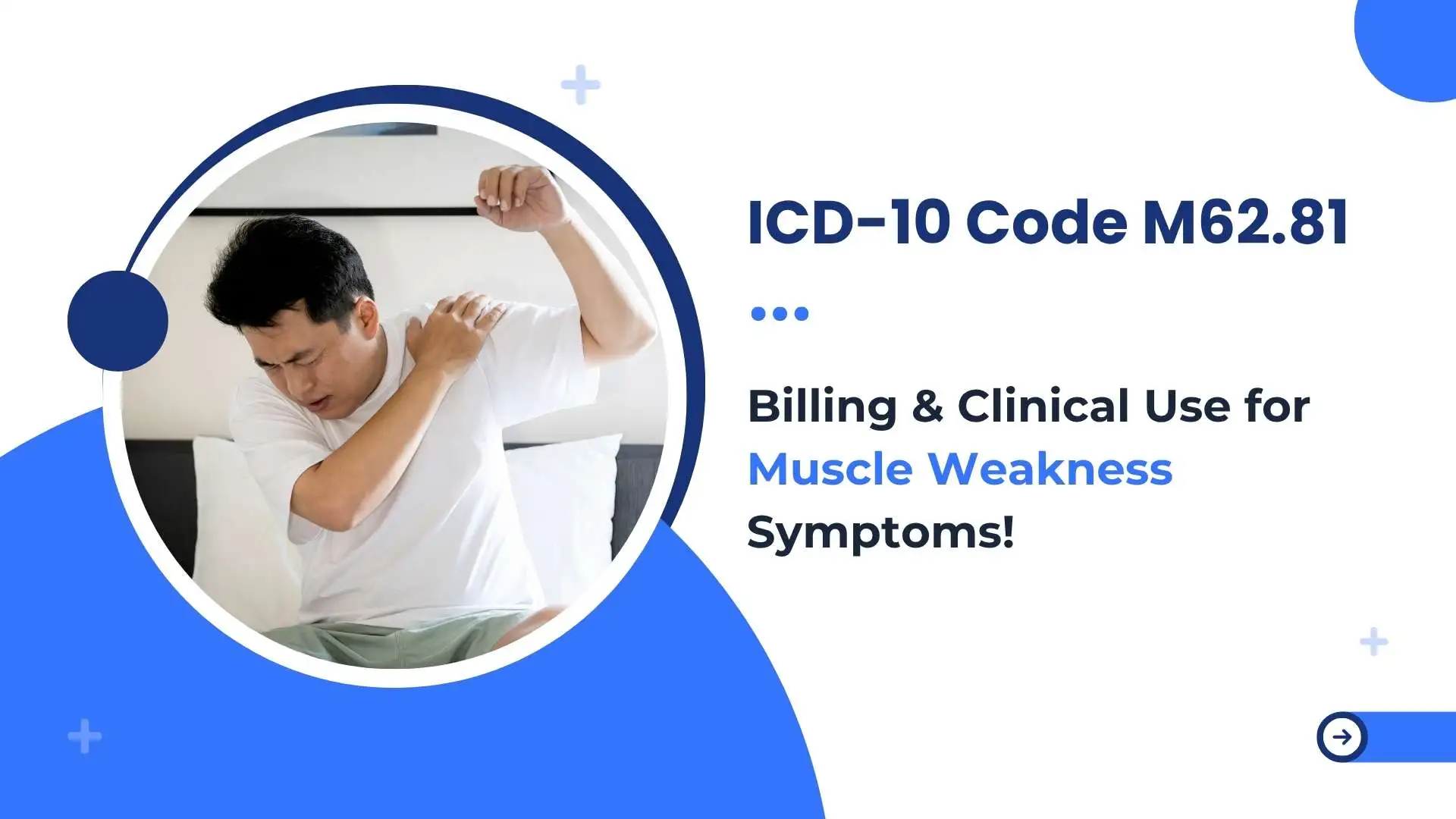Fun fact: Weakness is one of the most frequently cited symptoms in a multitude of conditions. That is a condition that affects millions of people all around the world and can have a lot to do with what is going in inside your body. If you are a healthcare professional or have something to do with medical billing, you may want to have a basic idea of what the ICD-10 code for muscle weakness is, especially if read M62.81, is essential.
In this article, we break down what ICD-10 code M62.81 represents, when to use it, and how it supports precise diagnosis and billing. Whether you are a provider, coder, or office administrator, this guide is expected to make you proficient in the specifics of generalised muscle weakness coding in ICD-10.
Understanding Muscle Weakness
What Is Muscle Weakness?
Muscle weakness as it relates to loss of power or even butt function?
While fatigue is generally temporary and can be tied to specific exertion, muscle weakness has myriad possible causes and can be chronic.
Common Causes
Muscle weakness should not be equated with a diagnosis; it is a sign or a symptom. Common causes include:
• Neurological conditions include strokes and multiple sclerosis.
• Metabolic imbalances, like not having enough electrolytes or thyroid conditions.
• Viruses, like post-viral fatigue syndromes.
• Ageing and sarcopenia, during which natural muscle mass decreases.
• Diseases linked to an overactive immune system, like myasthenia gravis.
For effective treatment, accurate diagnosis is essential and these conditions need to be coded correctly in order to bill properly. That’s where a generalised weakness ICD-10 code comes in.
ICD-10 Code M62. 81: An Overview
What Is an ICD-10 Code?
ICD-10 codes are the global standard for categorising health information related to diagnosis. Most used in healthcare, they allow a language-agnostic way to identify health issues, providing for consistency in medical records and billing.
M62.81 Explained
ICD-10 code M62. 81 is specifically “Muscle weakness (generalised)”. This code is reported to specify cases of generalised muscle weakness and not a group of muscles.
Exclusion Notes
When using M62. 81, it’s essential to follow exclusion rules:
• Excludes1: This is the code condition that cannot be used at the same time. There is a separate code for ICD-10 muscle weakness that is coded under M62.81, which does not take into account localised muscle weakness.
• Excludes2: In other words, both conditions cannot exist simultaneously, but they are not mutually exclusive.
Understanding these notes is crucial for coding and compliance purposes.
When to Use ICD-10 Code M62.81
Specific Scenarios
Correct application of ICD-10 code M62.81 varies, according to the clinical setting. Two examples are here:
Post-Viral Muscle Weakness:
A patient with recent recovery from a severe viral illness now has general weakness. The code would support the use of M62. 81 diagnosis code for insurance and treatment planning.
Age-Related Sarcopenia:
There is a loss of muscle strength and physical function in an elderly individual. In cases where generalized muscle weakness is present, ICD-10 codes are used.
If muscle weakness symptoms warrant further investigation, especially for respiratory causes, a Chest CT without contrast (CPT Code 71250) may be ordered to rule out underlying thoracic conditions. Learn more about CPT Code 71250 here.
When NOT to Use M62.81
M62.81 should not be used when muscles are weak locally and specifically.
For instance:
• In cases of focal weakness, ICD-10 codes specific to that area may be more appropriate than general codes.
• A symptom such as fatigue or malaise should be coded to category R53. 83 or other Fatigue or similar code numbers.
Correct classification is essential for adequate reimbursement and care planning.
1- Most common errors made when coding muscle weakness
Coding and billing errors can cause claim denials, revenue loss, and compliance issues. And here are some common pitfalls to avoid when coding for muscle weakness in ICD-10:
• Mistaking Muscle Weakness for Fatigue:
Generalized muscle weakness concentrates on decreased muscle power, while fatigue addresses tiredness. Make sure that n provider documentation clearly distinguishes these symptoms.
• Misusing Exclusion Rules:
Ignoring the Excludes1 and Excludes2 notes will result in incorrect coding. Just make sure you read all the exclusions.
• Insufficient Documentation:
Coding decisions need clear and detailed documentation. By not supplying certain information, you are potentially setting yourself up for non-payment or an audit.
Pro Tip: A complete patient evaluation with strong documentation can help you stay out of these traps.
What Providers Care Billing LLC Can Do for You
If you want expert guidance to ensure perfect coding, then you should seek the help of experts. Providers Care Billing LLC is a medical billing and coding service located in Illinois, USA. Our experienced team can deal with awkward codes such as M62! 81.
Why Choose Us?
• Low Cost – We offer services for as low as 2.89% to allow healthcare facilities to lower overhead expenses.
• Two Decades Of Accuracy: About That Site. With up to 4.9 stars out in the Play Store, With Premium, you can expect accurate and to the point, expert entries on what song you’re listening to.
• 100% Client Satisfaction: Become another satisfied provider in saving time and streamlining your billing with us.
You don’t want to leave coding mistakes that could be pricey. Call Providers Care Billing LLC now and make your medical billing easy.
FAQs
What is the distinction between weakness and fatigue?
Generally, weakness refers to a decrease in muscle strength, while fatigue refers to feeling tired. Good recording authors make the distinction between these conditions.
Can M62.81 be utilized for localized muscle weakness?
No, M62. 81 is for general muscle weakness. Circumscribed issues are coded separately at other, more specific ICD-10 codes.
Is there any document to support M62.81?
Key elements include:
• Symptoms are not primarily explained by fatigue or other conditions.
• Diagnostic proof, including physical examinations, laboratory findings.
• Physician notes supporting the generalized muscle weakness.
Real Client Testimonials
Our clients love what we do! Here’s what they say:
• “Providers Care Billing LLC continues to increase our coding accuracy and decrease our billing errors considerably. Highly recommend!” – Dr. Smith
• “They’re a great strategic partner, in terms of competitive rates and service.” – Jane Doe, Practice Manager
The Right Coding, The Right Billing, The Best Results
The significance of ICD-10-coded muscle weakness is immense. Accuracy is essential, from the treatment that works to the reimbursement that’s owed. Get expert help with Providers Care Billing LLC to make sure you are compliant, minimize errors, and grow your practice.
Start today! Contact Providers Care Billing LLC and get ready to eliminate the headaches of medical billing.





